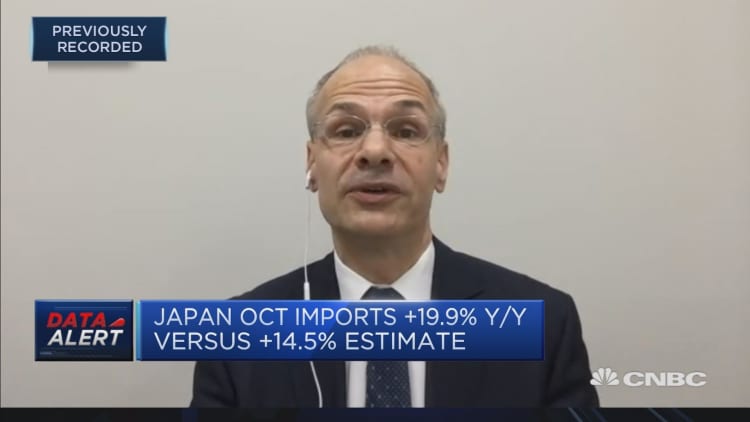Japan's government formally passed legislation over the weekend to allow more foreign workers in a move aimed at alleviating severe labor shortages that are a major drag on the Japanese economy.
That may not be enough to mitigate the nation's dwindling workforce.
From April next year, the world's third-largest economy will allow unskilled foreigners to work in 14 sectors such as construction and elderly care for up to five years. Skilled foreigners, meanwhile, will be able to migrate with their families and remain in Japan indefinitely. Prime Minister Shinzo Abe's cabinet first approved the laws last month.
Currently, unskilled workers are only accepted under an intern training program. Foreigners with specialized knowledge who don't apply for permanent residency can only live in the country for a limited time without family members.
It probably won't be enough to prevent the working-age population from shrinking altogether.Marcel ThieliantCapital Economics
In total, Tokyo plans to accept around 340,000 foreigners over the next five years. But that won't be enough to counter Japan's declining population, which dropped by 373,000 in 2017, said Kohei Iwahara, economist at Natixis Japan Securities. "Although the policy to open the door is on the right direction, the government needs to accept more."
High life expectancy levels and falling birth rates are set to drastically reduce Japan's working age population — defined as those under the age of 64. Presently, three out of 10 people are currently aged 65 years and older but that's set to increase to four in 10 over the next four decades, according to the International Monetary Fund.
"The changes to the immigration legislation means that the inflow of foreign workers over the next couple of years will probably exceed the 195,000 in 2017," said Marcel Thieliant, Senior Japan, Australia & New Zealand Economist at Capital Economics. "That will offset some of the roughly 500,000 annual decline in the working-age population over the coming decade, but it probably won't be enough to prevent the working-age population from shrinking altogether."

A fundamental issue is whether foreigners will embrace the new legislation, especially when they have to meet Japanese language requirements. It also remains to be seen if foreigners want to relocate to a country where the economy is on a structural decline, said Iwahara.
Ultimately, migration alone isn't expected to resolve Japan's aging population.
"We will lose 17.5 million working population in 20 years, it might be too late to make up those numbers," said Kotaro Tamura, a former senator and ex-parliamentary secretary for Japanese economic and fiscal policy. He recommended increasing productivity growth and finding alternative financing for the country's ailing social security system.
Assimilation issues
While Abe's administration also plans to use automation technology and artificial intelligence to deal with the labor crunch, it has realized that it can no longer ignore the option of more migrant workers. But many, including opposition politicians, are wary of the impact more foreign labor will have on Japan's homogeneous society.
Japanese people understand the need for migrants but they might not be ready to welcome them, said Tamura.

Language problems and diverging social customs are why many Japanese nationals and businesses are reluctant to accept foreign workers on a permanent basis, echoed Sayuri Shirai, professor at Keio University.
Restaurants, for example, are increasingly employing more migrants "but people say their services aren't good because of communication problems," she said. Many also worry that more foreigners will translate to a shifting Japanese culture and the specter of racial divisions, she added.
For unskilled foreigners, especially those from developing countries, the problem of human rights violations is another obstacle. The government has long faced criticism over the treatment of such workers, who work as "technical interns," amid numerous reports of sub-par working conditions, salaries that are below minimum wage and long hours.
With more unskilled workers set to arrive next year, more of such cases could occur, said Iwahara. The government has promised to deal with the issues, but no concrete measures have yet been announced, according to Shirai.

